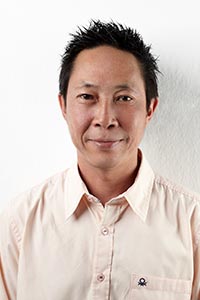
The best descriptions for the public's confusion over how the government is tackling violence in the far South and the latest problem in that region _ the Rohingya _ could perhaps be: two voices are worse than one; there is one voice that should not be ignored; so far, not so good.
Let's start with the violence. Deputy Prime Minister Chalerm Yubamrung and National Security Council (NSC) chief Paradorn Pattanatabutr obviously have different theories on who was behind the torching of 76 security cameras in seven districts of Yala province on Jan 14.
Mr Chalerm suspects business conflicts were behind the burning of the CCTVs in 43 locations across the southern province. He was not convinced that insurgents did the damage to the equipment.
Lt Gen Paradorn thinks not. On the same day that the deputy prime minister made known his belief, the NSC chief pointed his finger in another direction. He blamed militants for crippling the cameras and suspected that the vandalism was a prelude to more damaging operations by insurgents.
Last week, Mr Chalerm boasted about better cooperation from Malaysia to calm the insurgency in the border areas. It is good to hear that. But as long as the two main men of the Thai government responsible for putting an end to insecurity in the troubled region do not speak the same language and do not head in the same direction, it is difficult to see violence being scaled down in the region.
The vandalised cameras only confirmed one thing: that the government and security authorities are struggling to achieve what they long for. They are hardly offered cooperation by locals. It is not surprising at all to see the insurgents hit 43 locations to destroy the cameras with the authorities having no clue it was happening, even though it was the early hours of Monday morning when any traffic would stand out.
Do not forget that another 26 cameras were burned and severely damaged in Sai Buri district of Pattani on Dec 22 _ and thus far the answer to who was behind the operation is still blowing in the wind.
Narathiwat is the only province where security cameras survive. The question is, how much longer will they function if those who want to embarrass the authorities again attack them?
As the government is left bewildered about the mastermind behind the camera torching, it is an even more confusing question about what to do with the Rohingya being sheltered in southern provinces.
Mr Chalerm has shown sympathy towards them. Prime Minister Yingluck Shinawatra has joined the chorus, saying they should stay here in Thailand for humanitarian reasons while waiting for third countries to come and take them away.
The security camp led by Supreme Commander Gen Tanasak Patimapakorn and other generals is not impressed with that display of generosity and wants them to leave as soon as possible.
Blaming the top brass for showing no sympathy to them is too cruel, given the bitter experience Thailand had in handling Cambodian and Lao refugees when the region was plagued by the Indochina war and even refugees from Myanmar along the northern border today.
They have different roles to play for international and domestic consumption. Yet which position should the public listen to?
An attempt by the Foreign Ministry to hold talks with Myanmar to verify the refugees' origin will be a nightmare because the Rohingya are treated as third-class citizens by their government.
And then there is the lone voice of Noppadon Pattama.
He is extremely frustrated that nobody is listening to him over the Preah Vihear issue _ so he offered 2 million baht in cash for someone to challenge him.
His problem is his credibility because he is a close aide to former prime minister Thaksin Shinawatra.
He was right to back a joint statement with Cambodia on the listing of the temple as a world heritage site in 2008. That was the first time that Cambodia had indicated that the 4.6 square kilometres of disputed land was really a problem.
It will have legal implications for Thailand if it fights for the land claimed by the two countries in the future.
That future includes this year's legal battle with Cambodia in the world court over sovereignty in that area.
Saritdet Marukatat is Digital Media News Editor, Bangkok Post
